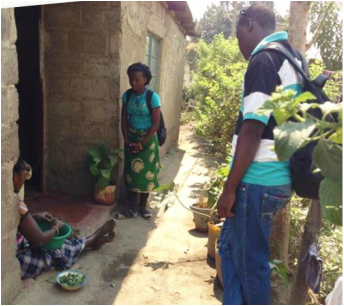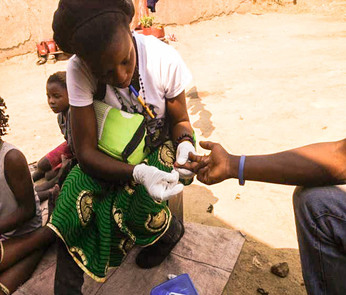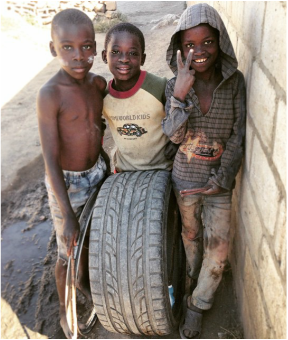Noah talked about some of the challenges and successes he and his team experiences over this grueling 2 weeks. "KNOWING THAT WE CAN SAVE A CHILD'S LIFE |
| What is it like in Chibolya? Chibolya compound originated from the migration of people from different places around Zambia in search of greener pastures, but basically ended up being a hiding place for armed robbers, drug dealers and prostitutes. There are basically no facilities there, especially health, education and police presence. The houses have no order and most don't have house numbers. This means finding your way around and finding people can be really difficult. When TTF do outreaches do you only focus on children? No, not at all, we test entire families and individuals who request it. |
What happened to the pregnant woman?
We tried to enroll her into TTF but she was worried about how to disclose her status to her husband - women are often fearful of seeking treatment because they don't know how their husbands will react. Women are still seen as the subordinates to men in a lot of the communities in Zambia. We work with a lot of people to help them with disclosure and offer couples counselling but sometimes husbands will refuse to get tested. We can give people support, information, counselling and provide follow ups to ensure they are seeking treatment but at the end of the day we cant force people - it has to be their decision, and this decision can take longer for some than others.
"WE HAVE A DUTY TO PEOPLE ........BY WORKING TO GET THEM ON ART WE ARE HELPING REDUCE THE RISK OF HIV TRANSMISSION"
| What were some highlights of your time in Chibolya? One example which stands out is that we tested a child who was found to be HIV+. Their guardian didn't know and therefore wasn't planning on taking them to the clinic. If we hadn't gone into this community this child, who had a very high viral load and low CD4 (basically meaning they were at risk of other infections), would probably have got sick from TB, Pneumonia or another illness and may not have made it . Now they are registered at TTF, getting medication, counselling and support - knowing that we can potentially save a child's life is why we do this work. What would you do differently? I want us to do more follow ups to find out what happened to people who tested HIV+ who didn't enroll in our clinic - this is time consuming and expensive but we have a duty to people to ensure they are receiving treatment and counselling - by working to get them on ART we are helping to reduce the risk of HIV transmission. Also I would take more food with me - it was a pretty grueling 2 weeks and I lost about 2kgs in weight! |
Leave a Reply.
archives
February 2024
November 2023
January 2021
December 2020
October 2019
November 2018
April 2018
December 2017
November 2017
October 2017
September 2017
June 2017
December 2016
November 2016
October 2016
May 2016
March 2016
December 2015
November 2015
October 2015
September 2015
July 2015
May 2015
March 2015
January 2015
December 2014
Categories
All
Birth
Children
Community Outreach
Counselling
Death
Donations
Dr Tim Meade
Fundraising
Grief
HIV
HIV Negative Children
HIV Testing
Loss
Lusaka
Nutrition
PMTCT
Tiny Tim & Friends
TTF Clinic
TTF Partnerships
TTF Women's Groups
Volunteer
Women's Rights
Young People And Adolescents
Zambia




 RSS Feed
RSS Feed